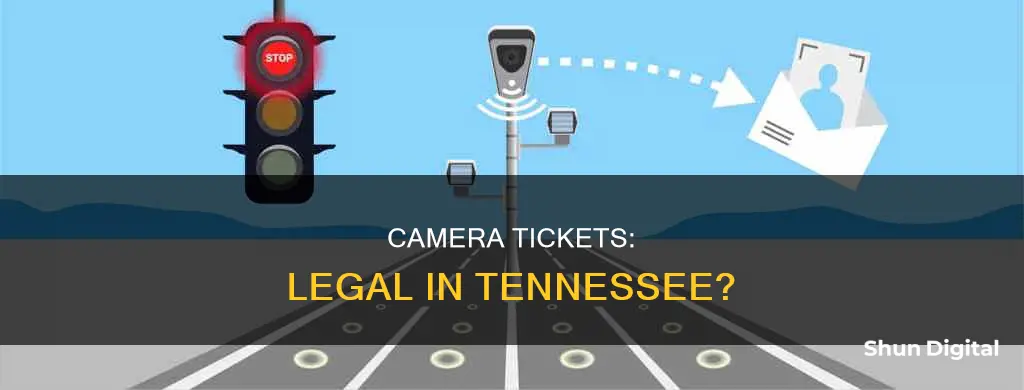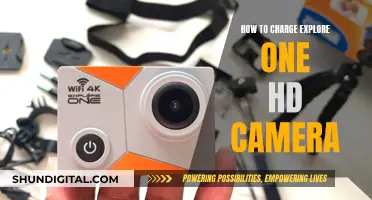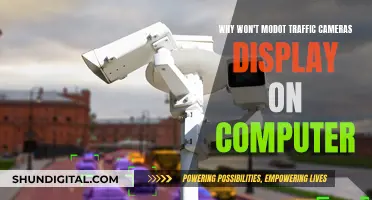
The use of camera tickets in Tennessee has been a controversial topic, with some questioning the legality of these citations. In Tennessee, camera tickets, also known as photo enforcement citations, are issued by cities like Memphis to enforce traffic rules. These tickets typically result in a fine, but there is debate over whether they are legally enforceable. While some Tennessee cities argue that the tickets are valid, others, including former state representative Andy Holt, contend that they are civil citations with no legal right to fine individuals. This controversy has led to proposed changes in state law to clarify the status of camera tickets and make it more difficult for cities to issue them.
| Characteristics | Values |
|---|---|
| Are camera tickets legal in Tennessee? | Yes, but they are considered civil citations, not criminal ones, so there are no legal repercussions for not paying them. |
| What are camera tickets based on? | Camera tickets are based on evidence obtained from unmanned traffic enforcement cameras installed to enforce or monitor traffic violations. |
| Who reviews the evidence and determines if a violation has occurred? | Only POST-certified or state-commissioned law enforcement officers are authorized to review video evidence and determine if a violation has taken place. |
| When is a notice of violation or citation sent? | A notice of violation or citation must be sent within 20 business days of the occurrence of the violation. |
| What information must be included in the notice of violation or citation? | The notice must include the amount of the fine, any additional fees or costs for non-payment or contesting the violation, and the address for payment or response. |
| How much time is given to pay the traffic citation? | The person cited has 30 days from the mailing date to pay the traffic citation before additional fees or court costs may be assessed. |
| Are there any exemptions from receiving a notice of violation? | Yes, emergency vehicles, vehicles moving to clear the way for an emergency vehicle, vehicles under police escort, and vehicles in a funeral procession are exempt. |
| Who is responsible for paying the notice of violation or citation? | The registered owner of the motor vehicle is generally responsible for payment, but they can provide an affidavit stating that another person or entity had control of the vehicle at the time of the violation. |
| Are there any restrictions on the use of unmanned traffic enforcement cameras? | Unmanned cameras cannot be used on federal interstate highways, except for specific types of cameras such as Smart Way cameras. |
| Are there any requirements for implementing new unmanned traffic enforcement cameras? | A traffic engineering study must be conducted before installing a new unmanned camera, and appropriate signage must be posted to inform drivers of the presence of traffic enforcement cameras. |
| What evidence is required to issue a citation for a red-light violation? | The evidence must clearly show the vehicle with its front tire before the stop line when the signal is red and then show the rear tire past the stop line while the signal is still red. |
What You'll Learn
- Red-light camera tickets in Tennessee are civil citations, not criminal ones
- You don't have to pay red-light camera tickets, but cities may try to collect
- Municipalities must conduct a traffic engineering study before installing a new unmanned traffic enforcement camera
- Only POST-certified or state-commissioned law enforcement officers can review video evidence and determine if a violation has occurred
- Traffic enforcement camera vendors are prohibited from conducting the traffic engineering study or participating in the selection of the engineer

Red-light camera tickets in Tennessee are civil citations, not criminal ones
The debate over red-light camera tickets in Tennessee has been ongoing for years, with many people taking issue with the ticket program. Holt has been one of the most outspoken critics, urging people across the state not to pay the tickets and even introducing a bill to make it harder for cities to hand out these citations. However, the bill was struck down before it left the committee.
Attorney Murray Wells supports Holt's stance, advising people to disregard the tickets as there appears to be no statutory authority to enforce them. While some people choose to pay the tickets to avoid potential long-term effects on their driver's license or credit, Wells asserts that most cases do not go to court. He believes that the cities are aware that if the other party shows up with a lawyer, the case is likely to be dismissed or appealed, cutting off their revenue stream.
It is important to note that while the majority of sources advise against paying red-light camera tickets in Tennessee, there are still some who argue for payment. Additionally, while the citations may not have an immediate impact on credit scores or driver's license points, there could be other consequences for non-payment that have not been specified.
To comply with state law, each citation must include a statement in large bold letters:
> "NON-PAYMENT OF THIS VIOLATION CANNOT HAVE A NEGATIVE IMPACT ON YOUR DRIVERS LICENSE, CAR INSURANCE RATES, OR CREDIT REPORT."
This statement reinforces the idea that red-light camera tickets in Tennessee are intended to be civil citations rather than criminal offenses.
The Evolution of the First Multiplane Camera
You may want to see also

You don't have to pay red-light camera tickets, but cities may try to collect
You don't have to pay red-light camera tickets, but cities will try to collect
Red-light camera tickets are a common issue for drivers in Tennessee, and while you may receive one of these tickets, you are not legally required to pay it. This is because, in Tennessee, red-light camera tickets are not considered a legal form of debt. This means that you cannot be arrested or sent to jail for failing to pay a red-light camera ticket.
However, just because you are not legally required to pay these tickets does not mean that cities will not try to collect on them. Cities in Tennessee have been known to employ aggressive tactics to try to collect on red-light camera tickets. This includes sending multiple notices, threatening late fees and other penalties, and even reporting unpaid tickets to credit bureaus, which could impact your credit score.
While these tactics can be intimidating, it's important to understand your rights. If you receive a red-light camera ticket, you can choose to ignore it or dispute it. Ignoring the ticket may result in continued collection attempts, but they cannot legally force you to pay. Disputing the ticket, especially if you have evidence of incorrect or malfunctioning cameras, may lead to a dismissal of the ticket.
To better navigate this situation, it's helpful to understand how red-light cameras work. These cameras are typically triggered when a vehicle enters an intersection after a red light, but they can sometimes result in incorrect tickets, such as for legal right turns or when a vehicle was already in the intersection. Reviewing any photo or video evidence associated with the ticket can help you determine if there is a valid reason to dispute.
In summary, while red-light camera tickets in Tennessee carry no legal consequence, cities may still attempt to collect on them. Understanding your options to address these tickets, whether ignoring or disputing them, can help you handle any potential challenges that arise.
Understanding the Size of Raw Camera Files
You may want to see also

Municipalities must conduct a traffic engineering study before installing a new unmanned traffic enforcement camera
In 2011, the authority of municipalities to own, install and operate traffic surveillance cameras was hotly contested during the Tennessee General Assembly. The discussions resulted in the passing of Public Chapter No. 425 (HB1500/SB1684), T.C.A. § 55-8-198, which made significant changes to the existing traffic enforcement camera landscape.
One of the most important changes was the requirement that municipalities must conduct a traffic engineering study before installing a new unmanned traffic enforcement camera. This study must be carried out in accordance with the standard engineering practices of the Institute of Transportation Engineers (ITE) and must be certified by a licensed engineer who specialises in traffic engineering. A traffic camera vendor is prohibited from conducting the study or participating in the selection of the engineer.
The legislation also outlines the conditions under which municipalities can ticket vehicles turning right or left onto a one-way street at red lights using only unmanned camera evidence. In addition, with respect to speed cameras, unmanned traffic enforcement cameras used to monitor speed and issue speeding citations are prohibited except within designated school zones and S-curves of public highways or roads.
Charging Your Lumix Waterproof Camera: A Step-by-Step Guide
You may want to see also

Only POST-certified or state-commissioned law enforcement officers can review video evidence and determine if a violation has occurred
In Tennessee, traffic violations can be classified as either civil or criminal offenses. Civil traffic violations are considered infractions and are punishable by fines, mandatory attendance at driving school, and other non-incarceration sentences such as community service. Criminal traffic violations, on the other hand, are composed of more serious offenses that are classified as misdemeanors or felonies. These types of violations are considered more severe due to their potential for causing injury, death, or property damage.
When it comes to camera tickets, also known as traffic citations based solely on evidence from a surveillance or traffic enforcement camera, there are specific procedures that must be followed. According to Tennessee law, only POST-certified or state-commissioned law enforcement officers are authorized to review video evidence from a traffic light signal monitoring system and determine if a violation has occurred. This means that the review of video evidence and the decision-making process cannot be delegated to other individuals or entities. The involvement of a POST-certified or state-commissioned law enforcement officer ensures the integrity and fairness of the review process.
Once a POST-certified officer reviews the video evidence and confirms a violation, a citation or notice of violation must be sent to the registered owner of the vehicle within a specified timeframe. This process is outlined in the Tennessee Code, specifically T.C.A. § 55-8-198, which includes several requirements for the use of unmanned traffic enforcement cameras and the issuance of citations based on camera evidence.
The law enforcement officer's role in reviewing video evidence and determining violations is a crucial aspect of the legal process for camera tickets in Tennessee. This ensures that the review is conducted by individuals with the necessary qualifications, training, and understanding of traffic laws and enforcement procedures. It adds a layer of accountability and helps protect the rights of vehicle owners, while also providing a clear framework for municipalities to operate within when utilizing traffic surveillance cameras.
In summary, the requirement that only POST-certified or state-commissioned law enforcement officers can review video evidence and determine violations in Tennessee is a key component of the legal framework surrounding camera tickets. This provision ensures the proper handling of evidence, reinforces the accuracy of violation determinations, and establishes a standardized process for issuing citations based on camera footage.
Unlocking Your Camera: Powering On Without the Cover
You may want to see also

Traffic enforcement camera vendors are prohibited from conducting the traffic engineering study or participating in the selection of the engineer
While I can see that you've provided me with search instructions, I'm unable to directly interact with any websites. However, I can still provide some information on traffic enforcement camera vendors and their prohibited activities.
In many jurisdictions, there are strict rules in place regarding the use of traffic enforcement cameras and the role of vendors who provide these technologies. In the context of Tennessee, it is important to understand the regulations that govern the relationship between traffic enforcement camera vendors and the traffic engineering study selection process.
Traffic enforcement camera vendors are typically private companies that provide the technology, equipment, and sometimes even the personnel, necessary for operating a traffic camera system. This can include fixed-position cameras that monitor specific intersections or mobile cameras that can be moved around a city to enforce speed limits or capture other traffic violations.
However, to maintain the integrity of the traffic engineering study and ensure unbiased results, it is prohibited for these vendors to conduct the study themselves or even participate in the selection process of the engineer who will perform the study. This separation is crucial to maintaining objectivity and ensuring that the study is conducted independently, without any potential influence or interference from vendors who may have a financial interest in the outcome.
The traffic engineering study plays a vital role in evaluating the effectiveness and impact of traffic enforcement cameras. The study typically involves analyzing data such as accident reports, traffic flow patterns, and speed surveys to determine if the implementation of enforcement cameras has led to an improvement in road safety and driver behaviour. By prohibiting vendors from influencing the study, it helps ensure that the evaluation is impartial and based solely on factual data.
In summary, the prohibition on traffic enforcement camera vendors conducting or participating in the traffic engineering study selection is a key measure to maintain the integrity and objectivity of the process. This regulation helps to prevent any potential conflicts of interest and ensures that the evaluation of traffic enforcement cameras is based solely on independent and unbiased assessments of their effectiveness in improving road safety.
Charging the Eufy 2C: Know When It's Ready
You may want to see also
Frequently asked questions
Camera tickets are legal in Tennessee, but they are considered civil citations, not criminal ones, so non-payment cannot adversely affect your credit report or credit score, your driver's license points, or your automobile insurance rates.
If you don't pay a camera ticket, you may be taken to court to collect the debt. However, according to West Tennessee State Representative Andy Holt, the cities with red-light cameras may not follow through with legal action, as it is not worth their time or energy to do so over a $50 fine.
In Tennessee, only POST-certified or state-commissioned law enforcement officers are authorised to review video evidence and determine whether a violation has occurred. If a violation has taken place, a notice of violation or a citation must be sent by first-class mail within 20 business days. The fine must not exceed $50, and additional fees or court costs may be assessed if the fine is not paid within 30 days.
Former State Representative Andy Holt introduced a bill in 2020 to make it harder for cities to hand out citations from red light cameras. However, this bill was struck down before it left the committee.







